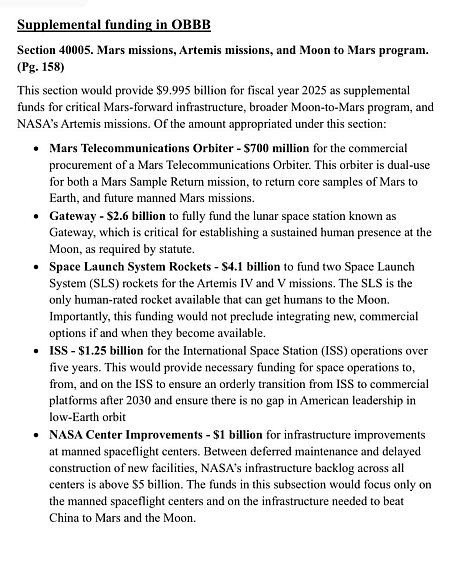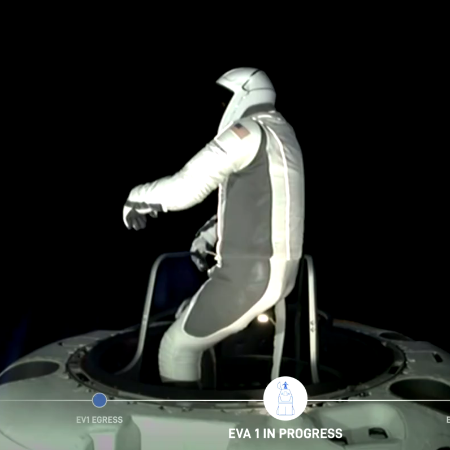House follows Senate in canceling most of Trump’s proposed NASA budget cuts

Like pigs at the trough
The House appropriations committee’s draft budget for NASA has followed the Senate appropriations committee in canceling all of Trump’s proposed NASA budget cuts, though it has shifted that funding significantly from science to manned space operations.
The House Appropriations Committee released the draft text of their version of the FY2026 Commerce-Justice-Science bill that funds NASA today. Like their Senate counterpart, the House committee would essentially keep NASA at its current funding level instead of imposing the severe 24.3 percent budget cut proposed by the Trump Administration. The CJS bill also includes almost $2 million for a White House National Space Council even though the Trump Administration has yet to establish one.
Unlike the Senate, which mostly kept the budget the same across all NASA departments, this House draft budget would reduce science and aeronautics spending from about $8.2 billion to $6.8 billion. Trump had requested only $4.5 billion for these departments.
In turn, the House would increase Trump’s request for NASA’s manned operations from $10.8 billion to $11.9 billion. Note that Trump’s proposed budget had already called for an increase here, so the House is clearly shifting funding to manned space in an enthusiastic manner.
At the same time, the House continues funding for the SLS and Orion programs Trump wishes to cancel. Both of these projects are over budget and behind schedule. Neither is very useful in the long run for exploring the solar system. If the House truly wanted to save money, it could easily fund all the cuts in science by cutting the billions spent yearly on these pork projects, and still lower NASA’s budget in total.
Based on the draft budget’s language [pdf], it is unclear whether the House has also funded the Lunar Gateway space station, as the Senate has, another useless pork project that Trump wishes to cancel.
I should note that the appropriations committee’s overall draft budget [pdf] does reduce the federal budget by about 2.8 percent. This is a marked change from past budgets, which often claimed (a lie) to cut spending but really only reduced the rate of budget growth. It appears the House is finally making some effort to shrink the size of the budget, though that effort is quite wimpy.

Like pigs at the trough
The House appropriations committee’s draft budget for NASA has followed the Senate appropriations committee in canceling all of Trump’s proposed NASA budget cuts, though it has shifted that funding significantly from science to manned space operations.
The House Appropriations Committee released the draft text of their version of the FY2026 Commerce-Justice-Science bill that funds NASA today. Like their Senate counterpart, the House committee would essentially keep NASA at its current funding level instead of imposing the severe 24.3 percent budget cut proposed by the Trump Administration. The CJS bill also includes almost $2 million for a White House National Space Council even though the Trump Administration has yet to establish one.
Unlike the Senate, which mostly kept the budget the same across all NASA departments, this House draft budget would reduce science and aeronautics spending from about $8.2 billion to $6.8 billion. Trump had requested only $4.5 billion for these departments.
In turn, the House would increase Trump’s request for NASA’s manned operations from $10.8 billion to $11.9 billion. Note that Trump’s proposed budget had already called for an increase here, so the House is clearly shifting funding to manned space in an enthusiastic manner.
At the same time, the House continues funding for the SLS and Orion programs Trump wishes to cancel. Both of these projects are over budget and behind schedule. Neither is very useful in the long run for exploring the solar system. If the House truly wanted to save money, it could easily fund all the cuts in science by cutting the billions spent yearly on these pork projects, and still lower NASA’s budget in total.
Based on the draft budget’s language [pdf], it is unclear whether the House has also funded the Lunar Gateway space station, as the Senate has, another useless pork project that Trump wishes to cancel.
I should note that the appropriations committee’s overall draft budget [pdf] does reduce the federal budget by about 2.8 percent. This is a marked change from past budgets, which often claimed (a lie) to cut spending but really only reduced the rate of budget growth. It appears the House is finally making some effort to shrink the size of the budget, though that effort is quite wimpy.









